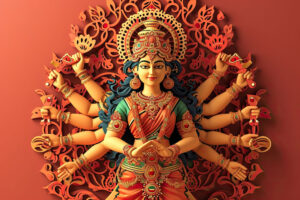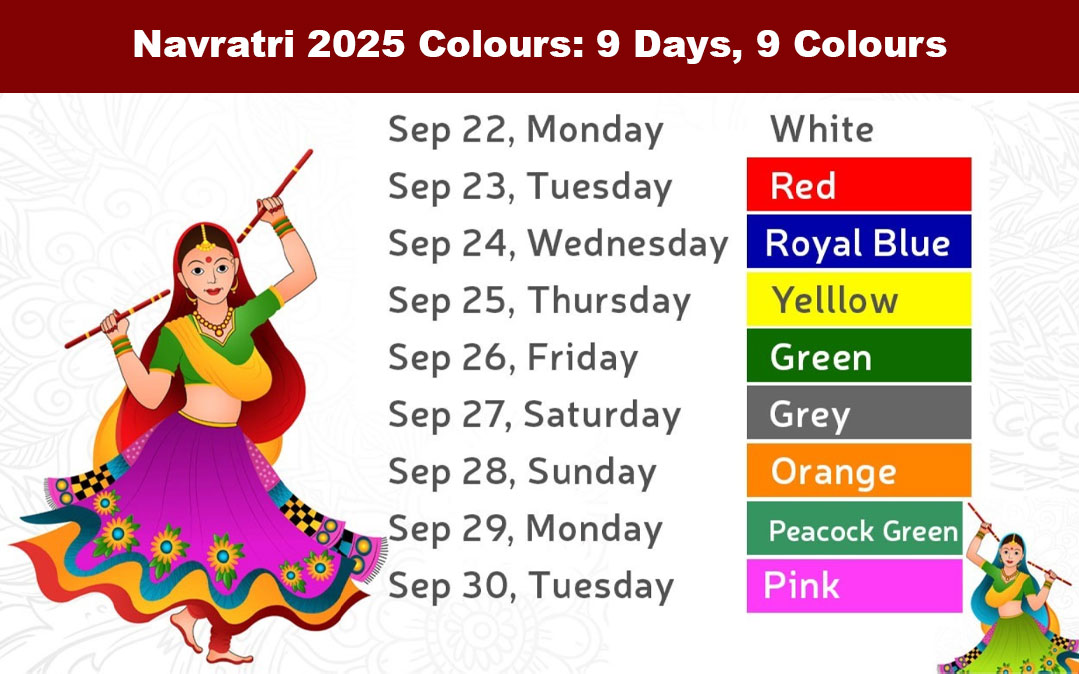One of the most important Hindu festivals is Navratri, the nine sacred days when devotees worship and honor Goddess Durga. Each day of Navratri is dedicated to a different form of the Goddess, and the festival is celebrated with great devotion and grandeur across India.
Although Navratri is observed four times a year—Chaitra Navratri, Magha Gupt Navratri, Ashadha Gupt Navratri, and Shardiya Navratri—the two most popular ones are celebrated during the Chaitra month (spring) and the Ashwina month (autumn).
In 2025, it will be Shardiya Navratri, which falls in the month of Ashwina. This year, the festival will begin on September 22, 2025, and end on October 2, 2025, with Vijayadashami (Dussehra). During these nine days and nights, devotees perform various rituals, pujas, fasting, and prayers to seek the blessings of Maa Durga.
A special aspect of Navratri is the role of colors. Each day is associated with a specific color that represents the qualities and powers of the Goddess worshipped on that day. Devotees wear these colors and offer corresponding rituals to show their devotion and attract blessings.

Let’s explore the nine colors of Navratri 2025 and the goddess each one represents.
| Navratri Date | Navratri Day | Navratri Colours |
| September 22, 2025 | Maa Shailputri | White |
| September 23, 2025 | Maa Brahmacharini | Red |
| September 24, 2025 | Maa Chandraghanta | Royal Blue |
| September 25, 2025 | Maa Kushmanda | Yellow |
| September 26, 2025 | Maa Skandamata | Green |
| September 27, 2025 | Maa Katyayani | Grey |
| September 28, 2025 | Maa Kaalratri | Orange |
| September 29, 2025 | Maa Maha Gauri | Peacock Green |
| September 30, 2025 | Maa Siddhidatri | Pink |
Navratri 2025 Colors : Significance
Navratri Day 1: White
White symbolizes purity and innocence. On the first day of Navratri, devotees wear white while worshipping Goddess Shailputri, seeking peace, serenity, and protection.
Navratri Day 2: Red
On the second day of Navratri, wear red—the color of sindoor, symbolizing love, strength, and passion. Worshipping the Goddess in red is believed to fill devotees with energy, vitality, and enthusiasm for life.
Navratri Day 3: Royal Blue
On the third day of Navratri, wear royal blue—a vibrant shade that symbolizes calmness, prosperity, and spiritual growth.
Navratri Day 4: Yellow
On the fourth day of Navratri, wear yellow while worshipping Goddess Kushmanda. This bright color brings joy, positivity, and festive energy to the celebrations.
Navratri Day 5: Green
On the fifth day of Navratri, wear green—a color that symbolizes nature, harmony, growth, and fertility. It represents fresh starts and new beginnings.
Navratri Day 6: Grey
On the sixth day of Navratri, wear grey—a color that represents balance, stability, and staying grounded in life
Navratri Day 7: Orange
On the seventh day of Navratri, wear orange while worshipping Goddess Navdurga. This vibrant color symbolizes warmth, energy, and enthusiasm.
Navratri Day 8: Peacock Green
On the eighth day of Navratri, wear peacock green while worshipping Maa Durga. This unique shade represents compassion, freshness, and a sense of renewal.
Navratri Day 9: Pink
On the ninth day of Navratri, wear pink—a color that represents love, harmony, and kindness. Beyond its beauty, pink adds charm and warmth to one’s personality.

